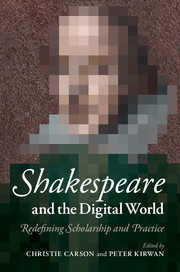Book contents
- Frontmatter
- Contents
- Notes on contributors
- Acknowledgements
- Shakespeare and the digital world
- Part I Defining current digital scholarship and practice
- Part II Defining current digital scholarship and practice
- 5 Internal and external Shakespeare
- 6 Shakespeare at a distance
- 7 ‘All great Neptune’s ocean’*
- 8 ‘From the table of my memory’*
- Half-time: A pause for reflection
- Part III Redefining the boundaries and practices of Shakespeare studies online
- Part IV Redefining the boundaries and practices of Shakespeare studies online
- Index
- References
6 - Shakespeare at a distance
Published online by Cambridge University Press: 05 July 2014
- Frontmatter
- Contents
- Notes on contributors
- Acknowledgements
- Shakespeare and the digital world
- Part I Defining current digital scholarship and practice
- Part II Defining current digital scholarship and practice
- 5 Internal and external Shakespeare
- 6 Shakespeare at a distance
- 7 ‘All great Neptune’s ocean’*
- 8 ‘From the table of my memory’*
- Half-time: A pause for reflection
- Part III Redefining the boundaries and practices of Shakespeare studies online
- Part IV Redefining the boundaries and practices of Shakespeare studies online
- Index
- References
Summary
Introduction
As a mode of delivery, distance programmes bring both pedagogic challenges and benefits in relation to the question of how to create a participatory virtual learning environment within which an engaged, interactive student cohort, however socio-culturally and geographically disparate, may engage as independent learners. Yet new media and technological advances are opening up exciting and innovative ways of exploring collaborative teaching and learning environments which are not only necessary and beneficial to the creation of programmes delivered at a distance, but also pay dividends when applied to on-site teaching scenarios, particularly in a blended learning environment. If ‘Shakespeare’ really operates as a global brand in the ways that so many critics and scholars have asserted, then it would appear that he represents the perfect vehicle through which to capitalise on these possibilities (Lanier, 2007: 93–113; Hodgdon, 1998).
Erin Sullivan in this volume observes that too much can be made of the distinction between distance and face-to-face learners and that learning outcomes rather than digital tools should be the drivers of course design (above 66). There is wisdom in this view, but there is also value in asking what the distance-learning opportunity, especially when focused around a global brand such as Shakespeare, might afford us in terms of innovative teaching and learning experiences that might themselves help to create and foster the kind of international learning community that we have as our cohort at the University of Nottingham. The field of Shakespeare adaptation studies is particularly pertinent in this respect; not only is Shakespeare remade and re-imagined in a range of genres and media (full-length and short film, video, graphic novel, song, video game, novel, poetry, prose) but he is also reshaped in a variety of cultural and geographical contexts. As Sonia Massai observes, ‘the field of Shakespeare Studies has been radically transformed by the emergence of significant world-wide localities, within which Shakespeare is made to signify anew’ (2005a: 8).
- Type
- Chapter
- Information
- Shakespeare and the Digital WorldRedefining Scholarship and Practice, pp. 75 - 86Publisher: Cambridge University PressPrint publication year: 2014

